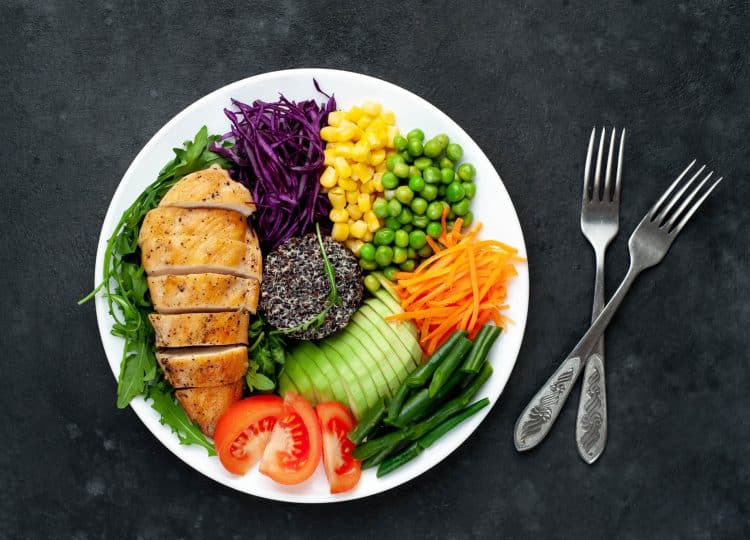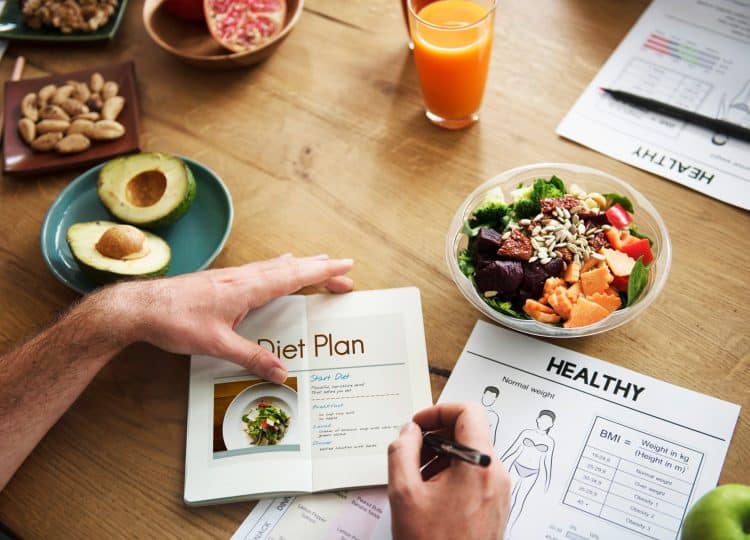As a veteran personal trainer, I’ve helped hundreds of people lose weight. This is hardly surprising as, according to the Centers for Disease Control and Prevention (CDC), over two-thirds of adults are overweight, and more than 42 percent are obese (1). Being overweight is not just common; it’s the new normal for many people.
Of course, I’m more than happy to help reverse this trend!
In most cases, I recommend that my clients lose weight slowly – usually about 1-2 pounds per week. While this isn’t as fast as most people want, it’s sustainable and won’t require an ultra-strict diet or long, exhausting workouts.
Of course, some people always want or need to lose weight faster. Maybe it’s for a wedding, a school reunion, or some other big event.
In that case, they may be willing to break some rules and adopt a much lower-calorie diet. Some will consume as few as 1000 calories per day to lose weight as quickly as possible. While I don’t usually recommend 1,000-calorie diets, I acknowledge they exist, and people are going to try them no matter what I advise.
So, in this article, I’m going to discuss the pros and cons of eating just 1,000 calories per day and provide a sample meal plan.
What is A 1,000-Calorie Diet?
A 1,000-calorie diet is an ultra-restrictive eating plan where you consume just 1,000 calories per day. Such a low-calorie diet will either consist of several small meals per day or fewer but slightly larger meals. Some are liquid-only or use meal-replacement shakes. All these options work, and it’s up to you to determine which eating schedule is best.
The meals themselves comprise primarily low-calorie foods. This ensures you get to eat a reasonable amount of food. Invariably, this means lots of fibrous and non-starchy vegetables, moderate protein, and very little fat.
1000-Calorie Diet Pros
What are the benefits of eating just 1,000 calories a day? Let’s investigate!
Rapid Weight Loss
The CDC recommends that most people should aim to lose about 1-2 pounds per week (2). However, consuming just 1,000 calories per day will lead to much faster weight loss.
How much weight you’ll lose by consuming just 1,000 calories per day depends on several factors, including your age, weight, and activity levels. That said, assuming your very low-calorie diet produces a deficit of about 1,500 calories per day, you can expect to lose three or more pounds per week.
Increased Motivation
Slow and steady usually wins the weight loss race. That said, staying motivated for months at a time can be hard for some people. If you’ve got a lot of weight to lose, e.g., 50 pounds, you could end up dieting for a year or more. Such a lengthy undertaking can undermine your willpower and, in some cases, even stop you from starting your weight loss journey.
However, losing weight faster means your diet won’t last as long. Instead of taking a year, you could potentially lose 50 pounds in ten weeks. While such an undertaking won’t be easy, knowing it’ll be over relatively quickly can be more appealing and motivating.
You can Lose Weight on Short Notice
Imagine the scenario: Your partner has booked a surprise vacation for next month. You’ve been slacking in the gym lately and eating too much junk food, so you don’t feel beach-ready. In fact, you’re dreading the idea of putting on your swimsuit.
Four weeks is not long to get in shape, but if you follow a 1,000-calorie diet, you could lose ten or more pounds in that time.
Motivated to look your best for your vacation, you slash your calorie intake to 1,000, and the pounds soon start to drop off. So, when the time to go on vacation arrives, you feel happier, more confident, and ready to hit the beach.
You’ve Been Overeating Lately
While it’s generally best to eat healthily all year round, there are periods when overeating is more likely. For example, Thanksgiving, Christmas, and New Year all arrive in close succession. Celebrate all these holidays, and you could find yourself overeating for two months straight. One way to put all this overindulgence behind you is with a couple of weeks on a strict 1,000-calorie-a-day diet. This could reverse the damage caused by your festive overeating and get you back on track for the rest of the year.
1,000-Calorie Diet Cons
Eating just 1,000 calories a day is not for everyone. In fact, it’s not an approach that many people should even consider. That’s because there are several cons and drawbacks to eating so few calories. These include:
Severe Hunger
If you are used to eating 2,000-3,000 calories a day and suddenly slash your intake by 1,000, severe hunger is inevitable. Hunger is caused and made worse by several factors, including low food intake, hormone and blood glucose fluctuations, and rapid weight loss.
Your body requires a steady supply of food, and it uses hunger to remind you that you need to eat. It doesn’t care that you’re trying to lose weight.
Filling up on high-fiber, low-calorie foods and drinking lots of water can help reduce hunger. However, even with these tricks, hunger is inevitable. As such, you’ll need to use your willpower to stick to your 1,000-calorie-a-day diet. Unfortunately, willpower can run out, which is why some people will not be able to maintain such a strict eating plan.
Low Energy
Don’t expect to be full of energy on a 1,000-calorie-a-day diet. While your body will be burning fat for fuel during this time, it needs an abundance of carbs and glucose to perform at its best. Your brain runs on glucose, which is also the main energy source for your muscles.
Eating just 1,000 calories a day means you probably won’t feel very energetic. This will limit your ability to perform even the most straightforward physical activities, and exercising will be particularly challenging. Because of this, athletes and exercisers will probably struggle on a 1,000-calorie diet.
Difficulty Concentrating
As mentioned above, your brain’s preferred source of energy is glucose, which we get from carbohydrates. Your brain uses about 600 calories per day, so consuming just 1,000 means there may not be enough fuel for optimal brain function.
Also, with hunger and food constantly on your mind, you’ll probably feel distracted and less able to concentrate.
Long story short, a 1,000-calorie-a-day diet won’t do much for your concentration, memory, creativity, or problem-solving ability. As such, it would be a bad idea to try this diet if you have a technical job, do a lot of driving, are studying for exams, or otherwise need your brain to function at its best.
Muscle Loss
While losing fat is inevitable on a 1,000-calorie diet, you’ll probably lose some muscle mass, too (3). How much muscle depends on how long you stick to your diet, your protein intake, and whether you lift weights. However, some muscle loss is inevitable.
Losing muscle will lower your metabolic rate, reduce your functional strength, and could lead to becoming “skinny fat.” Needless to say, none of these changes are beneficial and are usually things dieters try to avoid.
Malnutrition
Food is more than just a source of energy. It also contains the macro and micronutrients your body needs to function correctly. Low-calorie diets can leave you deficient in vitamins, minerals, and fiber, which are critical for health and performance.
For example, too few essential minerals can affect heart rhythm, blood pressure, and muscle contractility. As such, very low-calorie diets can be unhealthy and even dangerous.
Mood Fluctuations
Have you ever heard the term “hangry?” It describes how some people get angry when they are hungry. Usually, a snack fixes them right up, and they feel fine soon after eating. Now, imagine being hungry all the time – as is likely on a 1,000-calorie-a-day diet. Needless to say, your normally sunny disposition will probably vanish into thin air!
Food and mood are inextricably linked (4), and eating far less than usual will mess with your emotions. Expect to feel short-tempered, moody, depressed, anxious, and otherwise out of sorts. This will be unpleasant for you, as well as those around you.
Sample 1,000 Calorie Diet Eating Plan
So, you’ve weighed the pros and cons and decided to try a 1,000-calorie-a-day diet. Here’s a sample eating plan to follow or use as inspiration for creating your own diet. Remember to record your meals using a food tracking app to ensure you are hitting your 1,000 calories-a-day target.
Day 1:
Breakfast (300 calories):
- 2 scrambled eggs with 1 cup spinach and 1/2 cup tomatoes (150 cal, 12g protein, 9g fat, 10g carbs)
- 1 slice whole-grain toast (70 cal, 2g protein, 1g fat, 13g carbs)
- 1/2 cup non-fat plain Greek yogurt with 1/2 cup berries (80 cal, 15g protein, 0g fat, 9g carbs)
Lunch (300 calories):
- 4 oz Grilled chicken breast with 1/2 cup quinoa (150 cal, 23g protein, 3g fat, 15g carbs)
- 1 cup mixed vegetables – broccoli, bell peppers, carrots (100 cal, 4g protein, 1g fat, 20g carbs)
- 1 tablespoon olive oil (50 cal, 0g protein, 5g fat, 0g carbs)
Snack (100 calories):
- 1 medium apple, sliced with 1 tablespoon almond butter (100 cal, 1g protein, 7g fat, 9g carbs)
Dinner (300 calories):
- 4 oz baked salmon with 1 medium sweet potato (150 cal, 23g protein, 4g fat, 12g carbs)
- 1 cup steamed asparagus (100 cal, 4g protein, 0g fat, 20g carbs)
- 1/4 cup quinoa or brown rice (50 cal, 2g protein, 1g fat, 10g carbs)
Day 2:
Breakfast (300 calories):
- 1/2 cup oatmeal with 1/2 cup almond milk, topped with 1/2 sliced banana and 1 tablespoon chia seeds (200 cal, 5g protein, 5g fat, 35g carbs)
- 1 hard-boiled egg (70 cal, 6g protein, 5g fat, 1g carbs)
- 1 medium orange, sliced (30 cal, 1g protein, 0g fat, 8g carbs)
Lunch (300 calories):
- Turkey and avocado wrap with 1 whole-grain tortilla (200 cal, 15g protein, 10g fat, 15g carbs)
- 1 cup mixed green salad with balsamic vinaigrette (100 cal, 2g protein, 7g fat, 10g carbs)
Snack (100 calories):
- 1 cup carrot sticks and cucumber slices with 2 tablespoons hummus (100 cal, 3g protein, 5g fat, 15g carbs)
Dinner (300 calories):
- 4 oz stir-fried tofu with 1 cup broccoli and 1/2 cup quinoa (200 cal, 15g protein, 8g fat, 20g carbs)
- 1 cup steamed green beans (50 cal, 2g protein, 0g fat, 12g carbs)
- 1 cup sliced strawberries for dessert (50 cal, 1g protein, 0g fat, 12g carbs)
Day 3:
Breakfast (300 calories):
- 1 cup smoothie with kale, 1/2 banana, 1 scoop protein powder, and 1 cup almond milk (200 cal, 15g protein, 5g fat, 25g carbs)
- 1/2 cup low-fat cottage cheese with 1/2 cup pineapple chunks (100 cal, 15g protein, 2g fat, 8g carbs)
Lunch (300 calories):
- 4 oz shrimps and vegetable stir-fry with 1/2 cup brown rice (200 cal, 20g protein, 3g fat, 25g carbs)
- 1 cup mixed berries for dessert (100 cal, 2g protein, 1g fat, 25g carbs)
Snack (100 calories):
- 1/4 cup of almonds (100 cal, 4g protein, 9g fat, 4g carbs)
Dinner (300 calories):
- 4 oz grilled chicken with 2 cups mixed greens, cherry tomatoes, and vinaigrette dressing (200 cal, 25g protein, 5g fat, 15g carbs)
- 1 medium baked sweet potato fries (100 cal, 2g protein, 2g fat, 20g carbs)
1,000 Calorie Diet – Closing Thoughts
While it usually takes years to gain weight, most people want to lose weight as fast as possible. One way to do this is with a 1,000-calorie-a-day diet. While such an eating plan probably won’t be enjoyable or easy to stick to, it will produce rapid results.
However, for many people, the cons far outweigh the benefits of such a restrictive eating plan. Expect to feel hungry, tired, and moody during a 1,000-calorie diet. You’ll also lose muscle as well as fat.
But, if you are determined to try a 1,000-calorie diet, make sure you build your meals around nutritious ingredients such as lean proteins and vegetables. That way, your weight loss journey will be as healthy as possible.
Got questions about the 1,000-calorie diet, or weight loss in general? Drop me a line in the comments section below, and I’ll respond ASAP!
References:
- Centers for Disease Control and Prevention: Adult Obesity Facts. https://www.cdc.gov/obesity/data/adult.html
- Centers for Disease Control and Prevention: Losing Weight. https://www.cdc.gov/healthyweight
- Cava E, Yeat NC, Mittendorfer B. Preserving Healthy Muscle during Weight Loss. Adv Nutr. 2017 May 15;8(3):511-519. doi: 10.3945/an.116.014506. PMID: 28507015; PMCID: PMC5421125.
- Firth J, Gangwisch JE, Borisini A, Wootton RE, Mayer EA. Food and mood: how do diet and nutrition affect mental wellbeing? BMJ. 2020 Jun 29;369:m2382. doi: 10.1136/bmj.m2382. Erratum in: BMJ. 2020 Nov 9;371:m4269. PMID: 32601102; PMCID: PMC7322666.
Tip: If you're signed in to Google, tap Follow.














Great article and the meal plan is very helpful as well! Good to know both pros and cons before starting. I’ve been scammed too much by the fitness industry only giving me bits and pieces of what I need and then asking for more $$ to get to the next step, so over it!
I’ve been eating 850-1000 calorie per day and have lost 35 lbs. I’ve been at a plateau. If I increase my calories to 1500 don’t I risk gaining the weight back. And thank you for your service. 🇺🇸
Hi Tom,
Congratulations on your weight loss – awesome effort!
You may regain weight if 1500 calories exceeds what you need to maintain your weight. However, given that most men need closer to 2,000-2,500 I think you’ll probably be okay. Use our TDEE calculator to get a rough idea of your maintenance requirements and to see if 1,500 is too much. Or, perhaps just increase to 1,250 for a week and see what happens to your weight. If it stays stable, then add another 250. Keep doing this to determine a sustainable intake.
I hope that helps – and I wish you continued success!
Patrick.